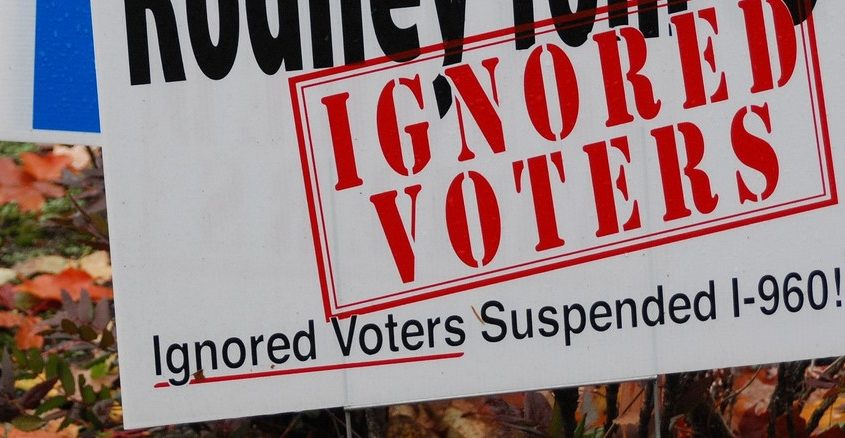
A McLin on Flickr. Original photo has been modified
Negative Campaigning in the U.S. Midterm Elections

Susanne Thelen
Institute of Political Science at the University of Technology Chemnitz
Susanne Thelen was a DAAD/AICGS Research Fellow from October to December 2018. She is currently a doctoral candidate at the Institute of Political Science at the University of Technology Chemnitz. Her PhD is about campaign strategies, especially “negative campaigning” in the 2017 German federal election.
Before beginning her PhD, Ms. Thelen interned at the Konrad Adenauer Foundation in Washington, DC, during the 2016 presidential election. Her Master’s thesis analyzed the Twitter attacks by presidential candidates Donald Trump and Hillary Clinton. In 2017, she worked for the CDU Department of Campaigning & Advertisement during the German federal election to continue her research about election campaigns.
Ms. Thelen lives in Rhineland-Palatinate and is a member of the CDU and a member of the State Executive Board of the CDU in Rhineland-Palatinate. She worked as a Retail Business Management Assistant, studied Business Administration and Marketing (BA), and holds a Master’s in Politics and Communications from the University of Trier.
During her time at AICGS, Ms. Thelen will focus on the differences between German and American campaign strategies. She will examine U.S. campaign strategies and American influence on German campaign strategies, including the ways in which they may serve as role models to some German parties. Moreover, the midterm elections in November 2018 may provide new perspectives on “negative campaigning” or other campaign strategies. Negativity in election campaigns is a part of political culture. While in Washington, Ms. Thelen will discuss this issue with other researchers, professors, and political experts, among others, investigating whether there are similarities or discrepancies between electoral campaigns in Germany and the U.S.
Role Model or Warning for German Campaign Strategies?
Negativity has long been a part of American election campaigns, and the 2018 midterm campaign was no exception. In the lead-up to November 6, almost 70 percent of the aired ads implied an attack—sometimes direct, sometimes implicit. Candidates imitated President Trump’s “style,” calling their opponents insulting nicknames; searched for content-related discrimination; or based their attacks on their opponent’s nationality or religion. On December 6, 2018, DAAD/AGI Research Fellow Susanne Thelen presented her research on negative campaigning in the U.S. elections in 2016 and 2018 and the German federal election in 2017.
German political parties prefer using more positive campaigning than negative campaigning, although they are not above implementing certain negative tactics in order to gain attention from the press or public.
Key Takeaways
- Negative campaigning is campaigning that attacks or is critical of an opposing candidate.
- Positive campaigning states why a candidate is worthy of your vote.
- Election scholar John Geer says that negative campaigning is good for democracy because you need proof and facts to back up attacks and defense. However, this has changed since 2016.
- Why do people opt for negative campaigns over positive ones? They usually garner more public and media attention. They can be especially mobilizing to voters who already favor one candidate over the other.
- Three kinds of attacks: trait, issue, and value attacks
- Trait attacks attack a person’s character such as their trustworthiness, reliability, or honesty, as well as their age, health, race, or gender.
- Examples: Beto O’Rourke using “Lyin’ Ted,” a nickname coined by Donald Trump in the 2016 Republican primary; Ron DeSantis using a racial slur when referring to his African American opponent in the Florida governor’s race.
- Issue attacks refer to political decisions of a candidate.
- Example: Challenger Jason Crow in Colorado criticized Congressman Mike Coffman for taking money from the NRA.
- Value attacks question a candidate’s “American values,” such as ties to foreign countries or support of the military.
- Examples: Representative Duncan Hunter released an attack ad against his opponent Ammar Campa-Najjar, whose grandfather was involved in the plot to murder Israeli athletes at the 1972 Olympic Games (despite Mr. Campa-Najjar repeatedly denouncing his grandfather’s actions). Ohio Representative Steve Chabot accused opponent Aftab Pureval of working with a law firm that supported Libyan terrorists (although Mr. Pureval had no connection to the case). Candidates also used support of Donald Trump against Republicans to imply anti-immigrant or racist values.
- Negative campaigning is far less common in Germany. Because Germany is a multi-party system with coalition governments, it is not that easy to attack one’s opponent while part of a “grand coalition.” From establishment parties, Germans don’t respond to attack advertisements. Strategies in the 2017 elections were mostly positive, with the CDU focusing on the popularity of Merkel and the SPD focusing on policies. When parties did go negative, they focused almost solely on the issues.
- The Alternative for Germany (AfD) produced the most negative advertisements, mostly through social media. They used the style of other party slogans and advertisements to make implicit attacks against their opponents, created websites attacking Angela Merkel’s policies, and blamed the chancellor for terror attacks in Germany.
- Role model or warning? It’s difficult to compare the two systems, as in the United States voters choose candidates but in Germany voters choose parties. The two-party system in the U.S. also makes it easier for opponents to attack each other; in Germany, the multiple parties must form coalitions and therefore try to get along. The amount of money in the U.S. system as well as the presence of PACs mean that candidates aren’t often in control of what kinds of advertisements are made. Germany has stricter data laws than the United States, meaning that they cannot microtarget certain advertisements like American campaigns.
- Ultimately, however, the U.S. model of negative campaigning is a threat to the German system. With the rise of populist parties like the AfD, negative campaigning, including value and trait attacks in addition to issue attacks, is becoming more common. Populists are especially using negative language to mobilize voters based on fear.








